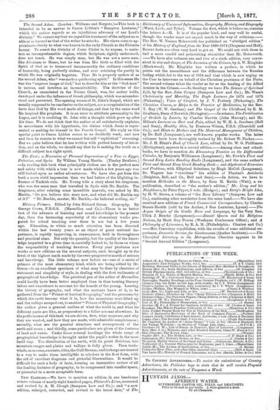The Second Adam. (London : Williams and Norgate.)—This book is
intended to be an answer to Canon Liddon's " Bampton Lectures," which the author regards as an injudicious advocacy of our Lord's divinity." We cannot say that we regard his treatment of the subject as BO able or so learned as that of the writer he attacks. His views seem to ap- proximate closely to what was known in the early Church as the Ebionite heresy. To assert the divinity of Jesus Christ is, he argues, to main- tain an incomprehensible dogma, which Scripture, rightly understood, does not teach. He was simply man, but He was not a mere man, like Abraham or Moses, but he was from His birth so filled with the Spirit of God as to transcend immeasurably the ordinary conditions of humanity, being perfectly sinless, and ever retaining the purity in which He was originally begotten. Thus He is properly spoken of as the second Adam, who" was made a quickening spirit." In this sense He was the "express image of God," but to describe him as the "God-man" is untrue, and involves an inconceivability. The doctrine of the Church, as enunciated in the Nicene Creed, was, the author holds, developed under the influence of Greek philosophy, which was misunder- stood and perverted. The opening verses of St. John's Gospel, which are usually supposed to be conclusive on the subject, are a recapitulation of the facts that God by His word made all things, and that by the same word He inspired His prophets. It is an error to attribute personality to the Logos, and it is crediting St. John with a thought which grew up after his time. We do not think that the author at all satisfactorily explains, in accordance with his hypothesis, the claims which Jesus is repre- sented as making for himself in the Fourth Gospel. His reply on this special point to Canon Liddon seems to us decidedly weak, and now and then he resorts to what we cannot but call "sophistical " reasoning. But we quite believe that he has written with perfect honesty of inten- tion, and on the whole, we should say that he is seeking the truth on a difficult subject in a right spirit.


































 Previous page
Previous page